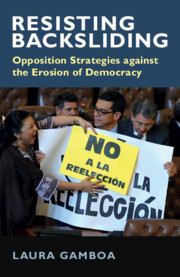Book contents
- Resisting Backsliding
- Resisting Backsliding
- Copyright page
- Dedication
- Contents
- Figures
- Tables
- Acknowledgments
- 1 Introduction
- 2 Opposition Strategies against the Erosion of Democracy
- 3 Electing Leaders with Hegemonic Aspirations
- 4 “Chávez Vete Ya”: The Erosion of Democracy in Venezuela
- 5 Preventing the Erosion of Democracy in Colombia
- 6 Opposition Strategies Elsewhere
- 7 Conclusion
- Book part
- References
- Index
1 - Introduction
Published online by Cambridge University Press: 10 November 2022
- Resisting Backsliding
- Resisting Backsliding
- Copyright page
- Dedication
- Contents
- Figures
- Tables
- Acknowledgments
- 1 Introduction
- 2 Opposition Strategies against the Erosion of Democracy
- 3 Electing Leaders with Hegemonic Aspirations
- 4 “Chávez Vete Ya”: The Erosion of Democracy in Venezuela
- 5 Preventing the Erosion of Democracy in Colombia
- 6 Opposition Strategies Elsewhere
- 7 Conclusion
- Book part
- References
- Index
Summary
In the past two decades, several democracies have slipped into democratic recession. Faced with economic or security crises, democratically elected executives in Latin America, the Middle East, Eastern Europe, and Africa have used their popularity to push for legislation – particularly constitutional amendments – that, over time, destroys systems of checks and balances, hinders free and fair elections, and erodes political rights and civil liberties. Across the world, these heads of government have found ways to subvert democratic norms while simultaneously maintaining a democratic façade. Using and abusing elections and institutional reform, they are turning new and old democracies alike into competitive authoritarian regimes.
Keywords
- Type
- Chapter
- Information
- Resisting BackslidingOpposition Strategies against the Erosion of Democracy, pp. 1 - 21Publisher: Cambridge University PressPrint publication year: 2022

